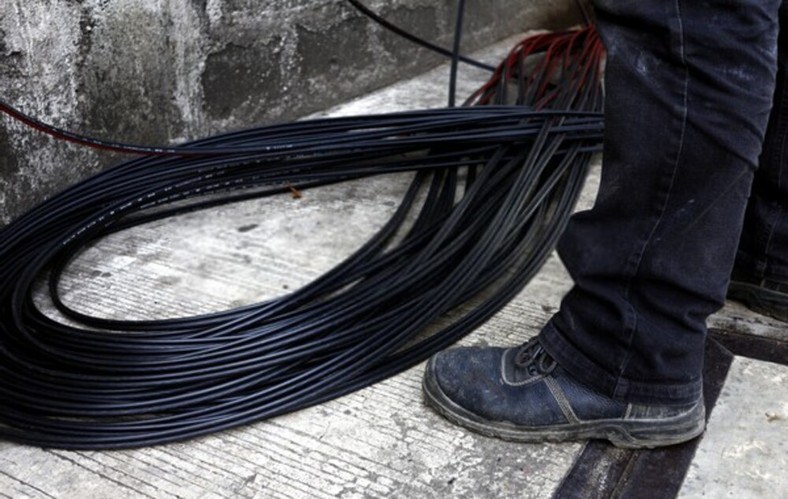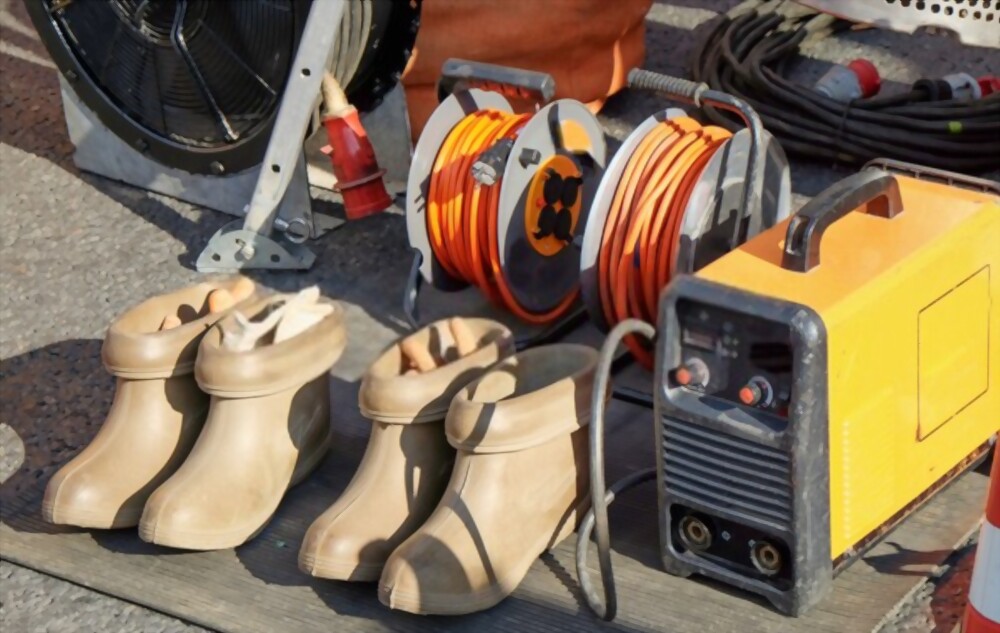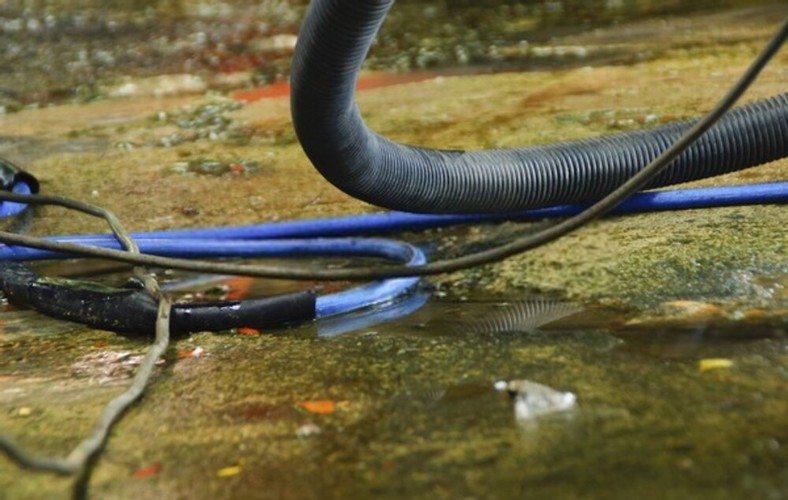The rubber boot is a staple in the electrician’s uniform. From climbing through attics to repairing underground power lines, the boots provide protection from the elements and a sturdy grip. To combat slips and falls, they’re usually made with a gripping tread in order to create traction on wet surfaces.
There are other types of lineman work boots that might be used by electricians, such as insulated ones or those with steel toes. These can come in handy for specific applications and projects, but the rubber boot is the workhorse and the type of boot most often worn by electricians.

A lot of electricians feel that their boots are comfortable and don’t want to switch to something else, even if it offers more protection or better grip. A lot of it has to do with personal preference versus having something more specialized in your tool box.
Some electricians consider rubber boots to be “gimmicky” and worry that they might not offer the same level of protection as steel-toed boots. The classic argument for this is that rubber boots can be particularly vulnerable against electrical shocks, which might cause a worker’s foot to pop off.
However, most electricians experienced with installing and servicing wiring and cables know that many rubber boots offer plenty of protection and still allow them to walk for extended periods of time.
Why Do Electricians Need To Wear Rubber Boots?

When working near an electrical hazard, such as on a construction site or in a similar environment, your safety is critical. Therefore, taking the proper precautions to protect yourself is highly suggested, whether due to a high current running through a live wire or weather circumstances that increase your shock risk.
Rubber boots and gloves are among the most popular clothing alternatives in an electrician’s work environment since rubber is one of the most extraordinary materials for preventing and minimizing your danger around an electrical hazard. If you’ve ever wondered how they function or why every electrician needs a nice pair of boots, you’ve come to the right place.
We’ve also broken down the essential variables to consider when selecting the best rubber boots for you and provided answers to some of the most often asked concerns.
An insulator is any substance that does not enable electricity to travel through it. This is why most powerlines are wrapped with rubber, electricians wear rubber gloves, and, most critically, rubber boots may protect against electrocution.
So based on this, rubber-soled boots can prevent you from being electrocuted.
Can you get electrocuted with rubber boots on?
Electrocution can be by wearing rubber-soled boots. However, just because you’re wearing rubber boots doesn’t mean you’re safe from electrical shock.
Conductors are materials that allow electricity to flow freely. Insulators are materials that make it difficult for electricity to pass through them. Electrical conductivity is weak in rubber, glass, plastic, and fabric. Electrical cables are generally coated in rubber, plastic, or cloth for this reason.
What should I wear to protect myself from electric shock, as well? Wear protective gear. Rubber-soled shoes and non-conductive gloves act as a barrier. Placing a rubber mat on the floor is also a good idea. Rubber does not conduct electricity, thus it will protect you from being electrocuted.
Protect yourself from electric shock

Electrical insulation is provided by rubber-soled shoes, which can help prevent shock current from flowing into the foot. Most traditional shoe designs, on the other hand, are not designed to be electrically safe since their soles are too thin and made of the improper material.
Workers work on live 110,000 volt lines and are safe since they do not come into contact with the earth or surrounding wires.
In practice, you must avoid using any other part of your body (not just your feet) to complete the electrical circuit, as well as being bumped or distracted by other people or items.
Assume the live terminal screw has become stuck in your boot. It must be removed from your boot, replaced in the screw hole, and tightened without coming into touch with earthed metalwork, earth, or neutral conductors. or permitting the unprotected live wire to come into contact with something.
You can’t touch it if it falls to the ground, and before you do, you should secure the live circuit so you don’t have to hold it.
If you’re working on a live household circuit and can’t turn it off for whatever reason, use insulated instruments designed for dealing with live circuits instead of your hands. (Not just rubber-grip pliers; pliers with 1000V written on the handles)
Electrically Safe Footwear

Industrial safety footwear comes in a wide range of styles and trends. They are also divided into groups based on the type of industry they work in. Safety boots or shoes have a steel toe to protect your foot from falling objects or being crushed.
A sturdy mid-palate is sometimes included in the boots to protect your feet’s soles from punctures if you step on a nail or other sharp object. Traditionally, reinforcements were made of steel, but they can today be made of composite materials, thermoplastic polyurethane, or aluminum.
Workers in most sectors and construction sites are required to wear protective footwear. Electricians must always wear electrical grade safety boots on the job because they are expected to work in a range of environments. Most countries demand that these boots be fully certified and that the certification be displayed on the side of the boot.
Industrial safety footwear comes in a number of fashionable styles, including clogs and running shoes. Safety shoes that look like dress shoes are also available. When safety shoes are essential, these are often worn by supervising engineers who must visit construction sites or monitor special projects.
Features Of Rubber Boots
It’s unclear whether or whether electricians use rubber boots for sanitary reasons. The boots could be worn to shield them from electrical risks, according to one explanation. Rubber boots, according to another notion, are required for people to work in restricted locations.
There are various reasons to wear rubber boots, such as keeping your feet dry or protecting yourself from injury, but I’m just going to discuss seven that are critical for all electricians, young and old.
Rubber boots are a popular choice for electricians because they provide excellent electrical protection. They are made of a non-conductive material which means that they don’t conduct electricity. Logger boots are another popular type of boot which is designed to offer increased traction and safety.
Insulation
Electricity, as a form of energy, is very dangerous. It must be contained and controlled effectively. Electrician business usually requires the use of electricity to work properly and safely, so many people involved in this profession are required to wear rubber boots.
Rubber is electrical insulation, so when you wear rubber boots, your feet will be insulated from electric conduct. If you don’t wear boots with good rubber soles, then the charge can attack your body through your feet and cause a serious problem that may lead to death.
It’s not just about the safety issue, but it is also the electrostatic discharge (ESD) that can affect your work performance and cause harm to you.
Protection
When an electrician is on the job, one of the most crucial things to consider is safety. While working on concrete or slippery surface, good safety work shoes and gloves will safeguard your feet and hands from risks.
High current or voltage protection can result in death or serious damage. Because rubber does not transmit electricity, it serves to protect electricians from high voltage, reducing the risk of mishaps that might occur when working on electrical lines.
Safety
When working, you should always be cautious of your surroundings. Even very dangerous gases like Hydrogen Sulphide (H2S) should be taken very seriously. The rubber helps to protect us from all types of gases or even acid spills on the ground during installation, which, if we stand on bare feet, can cause serious burns.
This is why rubber insoles would be very helpful. Something like this: Always remember that even though you are doing something very minor, it can still cause serious problems if precautions are not taken.
Electricians work with electrical and electronic devices and equipment’s in which they use to carry out their daily tasks, but because these pieces of equipment and material like cables and transformers.
Easy Inspection
I was wearing cowboy boots and blue jeans the first time I went into an electrical inspection. My inspector advised me to wear rubber boots and electrical tape to protect my shoes.
True, most electricians wear rubber boots, and many of them require them while on the job. If you don’t, there’s a considerable possibility you’ll trip over a wire or catch your foot in an electrical outlet on your way to work one day.
When strolling through a house, look for dry parts or damp regions to prevent establishing contact with the wires. Rubber boots make inspections easier, which can help minimize injuries and mishaps such as slipping in a puddle.
Make sure to check your shoes before walking on a potentially hazardous surface. You can add a non-slip sole to your shoes with these 10 hacks to make shoes non-slip, to help prevent slips and falls.
Easy Wearing & Removal
Because the rubber is resilient, it’s simple to put on because you don’t have to tie your shoelaces or buckle up, making it much easier than wearing shoes. In comparison to other types of footwear, rubber boots are simple to remove. Because they were designed with children in mind, the size is also appropriate for little children.
When it comes to how many hours you should wear your rubber boots, it all depends on the job. Long-shift electricians will find it easier because they will have less time per shift, and time will pass more quickly if there are no shoes involved. If an electrician was wearing a lace-up shoe, the job would take much longer, and the time would appear to be much longer.
Rubber boots are particularly useful if you need to stand for an extended amount of time because the arch support provides comfort. Because you can’t feel if your feet are growing fatigued or if you’re in discomfort from standing, rubber boots are ideal for standing for long periods of time.
Anti-Static
Rubber boots aid in the removal of static charge from the human body. Circuit boards and other electrical equipment can be damaged by static charges. Rubber can also aid in minimizing an electric charge by stopping current from traveling through the foot, so protecting you and your equipment.
Rubber is utilized to insulate the ground and keep power lines from cutting through your equipment.
“Wearing rubber boots can help prevent electrocution, electrical equipment damage, and physical shock.”
“It also helps prevent static electricity from accumulating on clothing or shoes, increasing the danger of electrical device damage and bodily limb shock.”
“It could be able to help defend against mains.”
Make sure your work boots meet safety standards by checking out anti-static work boots safety ratings and symbols. These ratings and symbols indicate if your work boots are suitable for your work environment. It’s important to prioritize safety when on the job, and anti-static work boots can help protect you from electrical hazards.
Comfort
Last but not least, rubber boots provide better comfort than other footwear. Rubber boots can protect you from hazardous objects such as heating and cooling vents, sharp objects under the floorboards, and water.
Electricians need rubber boots because of these reasons: they do not require a break-in period. They slide on easily and provide better grip than other types of footwear. Rubber boots also provide better comfort than other types of safety footwear and provide protection against hazardous circumstances that electricians may encounter while repairing electrical issues in homes or businesses.
Rubber Boots: Factors To Consider
Because a decent pair of boots can be so vital in terms of working safety, you should think about every detail before making a purchase. It doesn’t matter if you’re working on a live wire or repairing a power outlet; the correct protection is essential. You’ll find a breakdown of the most crucial aspects to consider while looking for a nice pair of rubber boots below.

Level of Security
When it comes to deciding which boots are best for your job, the amount of protection they provide is perhaps the most significant factor to consider. Because rubber is the most common waterproof material used in work boots, most of the boots you come across will provide the same level of protection.
A good pair of boots can assist ground you and prevent electricity from shocking you while working because of the high current traveling via wires and other electrical outlets. You will be able to work knowing you have taken the proper steps to ensure your safety by ensuring your chosen pair of boots has a high protection rating.
Fit
Because you’ll be wearing your boots on your feet frequently, you’ll want them to be as comfortable as possible. Finding the appropriate pair of shoes for your feet is crucial since a faulty pair of shoes can harm your feet and make them uncomfortable to wear.
Most high-end boots will not only cover your feet and toes but will also be lined with a pleasant insole to minimize harm from long-term use.
You will usually have to pay more for a comfy boot because luxury items will offer the most comfortable features. Keep an eye out for features like a foam insole or other similar improvements to get a sense of how comfy your footwear will be. If you are unable to try on a pair of boots prior to purchasing, you may also read customer reviews.
Durability
Because you’ll be wearing your new boots so frequently, they’ll need to endure a long time if you want to get the most out of them. You should treat your mints with mink oil or similar varnishes to protect them from harm, in addition to paying more for a more durable product. The more effort you put into keeping your boots in good condition, the longer they will last.
Budget As with every purchase, you should aim to stick to a strict budget, so you don’t end up spending more than you planned. Determine exactly what you want from your new pair of boots and how much you’re willing to spend on each feature.
However, because you will be working with live wires, you should be willing to pay a little extra for a boot that can provide the best amount of safety and comfort.
To better estimate how much you should spend on a premium product, determine what you expect from each boot and how often you plan on wearing them.
When it comes to work boots, not all materials are created equal. Leather work boots, like those from the most popular work boots brands, tend to be more durable compared to synthetic materials. They can withstand harsher conditions and last longer, making them a worthwhile investment.
Recommended Rubber Boots For Protection Against Electric Hazards

Muck Boot Men’s Chore XpressCoolThe new yet very comfortable
Inbuilt inner material in XpressCool boots ensures that your feet stay cool and dry in hot weather.
Spandura has been applied to the outer of the boots to provide wear and abrasion resistance. The boot has four-way stretch nylon that is 100 percent waterproof and flexible, as well as quick-clean rubber.
A steel shank is also included in the boots for added arch support and shovel handling. It complies with the ASTM F2413-11 M I/75 C/75 EH standard.
The lining of the sockliner helps to decrease friction and heat buildup. The Vibram outsole is made with cutting-edge technology to deliver maximum comfort.
The boots also contain a huge toe pad for increased toe-off traction, as well as wide, broad lugs that promote surface contact and stability. Finally, the inclusion of a grooved heel pad decreases the risk of slipping while allowing for optimal liquid dispersion.
Cofra 00040-CU3 Thermic Insulated Met Guard Composite Toe Boot

These rubber boots have a composite safety toe that meets or exceeds ASTM F2413-11 I/75 C/75 impact and compression criteria.
The puncture-resistant fabric, which is lighter and more flexible than steel and provides better thermal insulation, is one of the appealing qualities.
The boot’s slip-resistant soles, combined with the cleats’ close proximity, provide great grip and traction.
Thermic’s revolutionary polyurethane compound is paired with an innovative production process to provide insulation against cold temperatures while keeping the boots lightweight.
Also included is a cold barrier anatomic footbed that protects against chilly temperatures. The non-metallic toe cap provides adequate protection against all working risks.
VW88 Viking Ultimate Protection Work Boot
The Viking boots include an SBR mixed upper and cotton canvas inside, as well as a highly resistant rubber upper and circular saw, cut resistance.

These chainsaw-protected boots are CSA Omega electric shock resistant up to 18kv. It is certified to EN ISO 20345:2011. It’s also CSA Z195-14/ASTM F2413-11 approved, and it includes a steel toe for added safety.
The footwear is ideal for use in the oil and gas industry, forestry, trash and recycling facilities, plastering, road building, and other jobs that need daily contact with electric current. The Achilles-reinforced boots are abrasion, grease, heat, and slip-resistant.
Furthermore, the boots have an air-cushioned NBR lug sole that protects you from slipping onto rebar, protecting you from a variety of injuries. The protection work boots offer a snug fit design with a flex rating of 305,000.
Conclusion
Electricians should wear rubber boots when working in wet environments because they offer better traction. Electricians should not wear wet shoes when working on live circuits due to electrocution or electrical shock hazards.
According to OSHA, the following are the most common causes of electrocution injuries: falls, contact with energized parts, and contact with uninsulated conductors. OSHA reports that employees who fall onto exposed ungrounded conductors experience an 80 percent chance of sustaining an electric shock. Additionally, OSHA estimates that employers will experience $16 billion in direct and indirect costs over a 12-year period as a result of electrocution injuries and illnesses.
Electrical boots provide electrical insulation through the work boot sole, which provides protection from ungrounded conductors. Electrical boots also provide electrical insulation to the conductor inserted into the boot, which prevents an employee from contacting exposed conductors. These electrical boots were designed to protect both the wearer and those around him or her. Additionally, electrical boots do not conduct electricity, and can prevent an employee from contacting exposed conductors and electric shock hazards.
Additionally, employees who wear the boots may be able to hear better and walk better on wet floors due to the insulation of the footwear. This prevents electrical shock hazards, such as electrocution. Also, employees may be able to hear better due to the rubber bottoms of the footwear resulting in more accurate work information.
Electricians must consider their safety and those around them when working on live circuits such as wiring in a basement or attic.
Electrical shoes provide electrical insulation through the work boot soles to provide protection from ungrounded conductors and other hazards. Electrical shoes also protect the equipment, circuits, and workers from electrical shock hazards.
Electrical boots are made of rubber and metal with an outer layer of leather. However, electrical boots are now constructed with rubber soles to provide clearer sound when walking or working on wet floors in order to prevent injuries.
FAQs
Why is it impossible for electricity to travel through rubber?
Because rubber is non-conductive, electricity cannot pass through it, protecting you from the effects of an electrical shock. This is due to the fact that rubber lacks free electrons, also known as conductive electrons, which means that electricity cannot move through it. Insulators are materials that have few or no conductive electrons.
An electric current won’t be able to pass through your foot since there isn’t a clear path to the earth, and so electricity won’t be able to flow through your body. This keeps you from getting a fatal shock. When dealing with cables or other potential electrical risks, make sure to wear insulating gear.
Is it true that electricians wear rubber boots?
Although not all electricians wear rubber safety shoes, they are strongly advised to do so, and the majority do so. When working in an electrical environment, one of the most significant methods of safety you can do is to wear high voltage static electricity protection.
There are numerous elements to consider, but protecting yourself against electric current passing through objects such as a power line is critical. Rubber gloves and boots for each foot, as well as rubber-handled tools, are among the finest types of protection.
Is it true that wearing rubber shoes protects you against electric shock?
When working with an electric current, wearing safety footwear with a rubber sole is one of the best ways to reduce your risk of suffering an electric shock. Although they won’t always prevent an electrical hazard, they are incredibly successful at minimizing the likelihood of injury from risks. To reduce the danger of injury to your body, make sure your work boots have rubber soles or an outsole.
Your regular safety precautions should be taken in addition to protective equipment such as rubber work boots and gloves. Also, adhere to the rules and regulations established at your construction site or any other job site where you work since they are in place for a purpose.
It is a common misconception that wearing rubber shoes will protect you against electric shock, but in reality, the rubber soles of shoes don’t provide enough insulation to keep you safe. To prevent electric shock, it’s important to wear appropriate safety footwear such as steel-toed work boots that provide proper shock resistance.
What should you wear to avoid getting electrocuted?
When working with electricity, anything made of rubber or a comparable material is the best choice. By stopping electricity from passing through, items like rubber boots or gloves can lessen the risk of an electrical danger caused by a strong current. Humans, unlike birds, are extremely vulnerable to large electrical currents. Hence shielding each body component is critical.
When working with something that has high levels of electricity, boots and a good pair of rubber gloves are probably the best clothing options for protection. You will be able to work safer if your full body is protected from your foot to your hand. So go ahead and invest in a good pair of rubber shoes right now.
What kind of boots should an electrician wear?
The 3 Most Protective Composite Toe Boots For Electricians With Electrical Hazard Protection:
- -Carhartt Men’s CMF6366 Composite Toe Boots.
- -Thorogood Men’s Composite Safety Toe Gen Flex 804-4445 Work Boots.
- -Timberland PRO TiTAN Composite Safety-Toe Work Boots.
As an electrician, it is important to ensure safety and comfort while working. That is why wearing suitable work boots is crucial. Work boots such as steel-toed boots, insulated rubber-soled boots, or dielectric boots are some of the popular choices among electricians because of their durability and safety features. They can provide protection from electrical hazards while keeping electricians comfortable throughout the workday.
What happens when electricity hits rubber?
Many people assume that automobiles are secure from lightning because the rubber tires prevent lightning from hitting the vehicle, however this is a fallacy that has been debunked…. it will travel through the tires or even melt them. Rubber tires provide no lightning protection.
Who created rubber boots?
Arthur Wellesley
They’ve been around for more than 200 years, having been invented by the 1st Duke of Wellington, Arthur Wellesley, in 1817. Although today’s boots are made of rubber, the first Wellingtons were a type of leather boot.
As we all know, rubber boots are commonly used in various jobs, including electricians. But do electricians really need to wear rubber boots to work? The answer is yes! Wearing rubber boots can help keep the electricians safe from electrical shocks. In order to ensure that they are wearing the right kind of rubber boots, they should choose the boots that are specifically designed for electrical work. Check out ARIAT boots for a great option of safety work boots that are specifically designed for electrical work.
What do electrician wear while working with electricity?
Electricians wear rubber hand gloves while working with electricity because rubber is an insulator and protects them from electric shocks.
